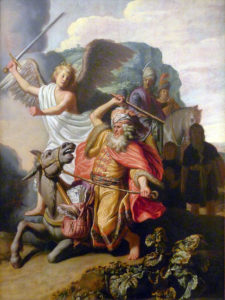
Balaam and the Ass – Rembrant (1626)
The Ancient Near Eastern mythological texts may appear to be obscure and irrelevant to us today. In reality, these texts continue to be influential since the structures of these polytheistic myths are embedded in later forms of Arabic monotheism which emerged a few centuries after Christianity & which gained dominance over vast stretches of territories in Asia and Africa.
Since these later forms of “monotheistic” religion developed from polytheism,* they are undergirded by the same polytheistic structure which portrays humans to be helplessly subject to the control of Fate. Note that Fate in ancient polytheistic religion is note fatalism because in the ancient polytheism, Fate can be manipulated through rituals of divination, incantations and sorcery. The rituals have intrinsic efficacy, but their efficacy is enhanced under the guidance and empowerment of the gods. However, such relief from Fate is temporary and limited since ultimately, even the gods are subject to Fate. Nevertheless, in principle, misfortune or ill-fated events can be discovered through divination so that proper rituals and incantations may be implemented to nullify them.
However, when Arabic polytheism later evolved into “monotheism”, that is, when all the gods were merged into one God, divination and sorcery were rendered ineffective since their rituals became deprived of assistance from the gods who have vanished. Furthermore, in contrast to the gods of polytheism, the God of the later forms of monotheism are not involved with the daily struggles of believers because he is supremely transcendent and inaccessible to mere mortals. The consequence is that without recourse to divination and sorcery, Fate can no longer be manipulated so that ill-fated events may be nullified. The ironic outcome of these later forms of monotheism is an equivalent of “Fate is control”. This leads to a sense of fatalism.
Nevertheless, since belief in the intrinsic efficacy of divination and sorcery remains deeply embedded in the former polytheistic society, it is not possible to remove them from the newly adopted monotheistic belief structure. They have to resurface one way or another. Not surprisingly, the various forms of divination, magical rituals, and incantations of holy texts continue to be pervasive among “folk-monotheism” practised by the majority of ordinary believers, in contrast to the “high monotheism” of the elites.
The only remedy that can prevent a relapse of sorcery and divination is Christian monotheism which testifies that while God is transcendent, he is not remote. Indeed, the good news of Christianity is that the transcendent God not only sends messengers to communicate his holy demands, but that he enters human history to reveal himself personally, and by his Spirit assists his followers in their daily life struggles. That is to say, only Christian monotheism can overcome the spectre of fatalism in all its guises.
Note: These observations arose out of my reading of Dr. Leong Tien Fock’s post, Structural Differences Between Genesis 1–11 and Mesopotamian Mythology.
———————–
* The adoption of monotheism by polytheistic society in the Arabian Peninsula centuries after the advent of Christianity does not invalidate the observation made by the Scottish anthropologist Andrew Lang in 1898 that the idea of the Supreme Being or “high God” existed in many primitive tribes prior to their contact with Western missionaries. Lang’s observation was further developed by the Austrian anthropologist Wilhelm Schmidt who proposed that Urmonotheismus or “original monotheism” was the original religion of mankind. However, “Original monotheism” degenerated into local forms of polytheism over time . Other anthropologists contested the idea of Urmonotheismus, but all agree with the truism that in the historical development of religion, monotheistic beliefs coexisted with polytheism. See Wilhelm Schmidt, The Origin and Growth of Religion: Facts and Theories (Wythe-North Publishing, 2014. Reprint of 1931 edition). See also, Wilfried Corduan, In the Beginning God: A Fresh Look at the Case of Original Monotheism (B&H, 2013).
Related Posts